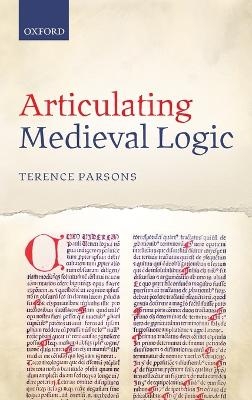
Articulating Medieval Logic
Oxford University Press (Verlag)
978-0-19-968884-5 (ISBN)
Terence Parsons presents a new study of the development and logical complexity of medieval logic. Basic principles of logic were used by Aristotle to prove conversion principles and reduce syllogisms. Medieval logicians expanded Aristotle's notation in several ways, such as quantifying predicate terms, as in 'No donkey is every animal', and allowing singular terms to appear in predicate position, as in 'Not every donkey is Brownie'; with the enlarged notation come additional logical principles. The resulting system of logic is able to deal with relational expressions, as in De Morgan's puzzles about heads of horses. A crucial issue is a mechanism for dealing with anaphoric pronouns, as in 'Every woman loves her mother'. Parsons illuminates the ways in which medieval logic is as rich as contemporary first-order symbolic logic, though its full potential was not envisaged at the time. Along the way, he provides a detailed exposition and examination of the theory of modes of common personal supposition, and the useful principles of logic included with it. An appendix discusses the artificial signs introduced in the fifteenth century to alter quantifier scope.
Terence Parsons was born and raised in Endicott, New York. He attended the University of Rochester as a physics major, receiving a BA degree. He received a PhD in Philosophy from Stanford University. He was a full time faculty member at the University of Illinois at Chicago from 1965 to 1972, at the University of Massachusetts at Amherst from 1972 to 1979, at the University of California at Irvine from 1979 to 2000, and at the University of California at Los Angeles from 2000 to 2012. He also visited briefly at the University of California at Berkeley and the University of Pittsburgh.
Preface ; Introduction ; 1. An Overview of Aristotelian Logic as seen by Medieval Logicians ; 2. Aristotle's Proofs of Conversions and Syllogisms ; 3. Quantifying Predicates, Singular Term Predicates, Negative Terms ; 4. Linguish ; 5. Expanding the Notation ; 6. Some Illustrative Topics ; 7. Modes of Personal Supposition ; 8. Relatives (Anaphoric Words) ; 9. Comparison of Medieval Logic with Contemporary Logic ; 10. Ampliation and Restriction ; Appendix: Artificial Quantifiers in Early 16th Century Logic ; Bibliography ; Index
| Verlagsort | Oxford |
|---|---|
| Sprache | englisch |
| Maße | 162 x 240 mm |
| Gewicht | 676 g |
| Themenwelt | Geisteswissenschaften ► Philosophie ► Logik |
| Geisteswissenschaften ► Philosophie ► Philosophie des Mittelalters | |
| Sozialwissenschaften | |
| ISBN-10 | 0-19-968884-2 / 0199688842 |
| ISBN-13 | 978-0-19-968884-5 / 9780199688845 |
| Zustand | Neuware |
| Haben Sie eine Frage zum Produkt? |
aus dem Bereich


